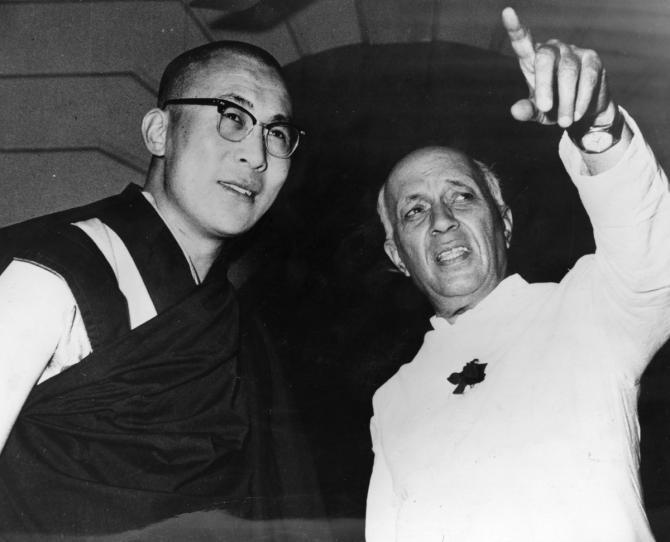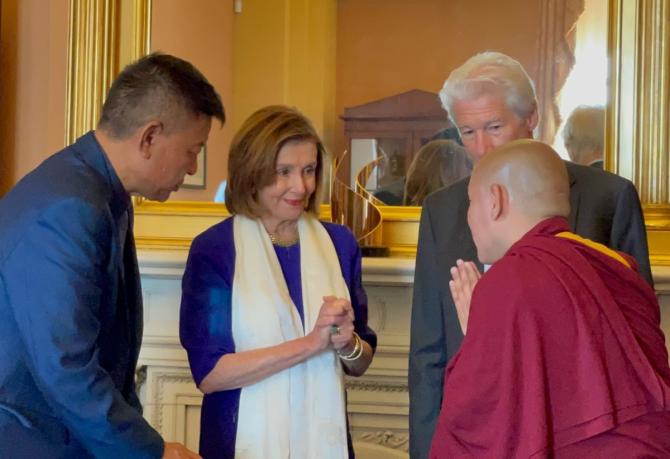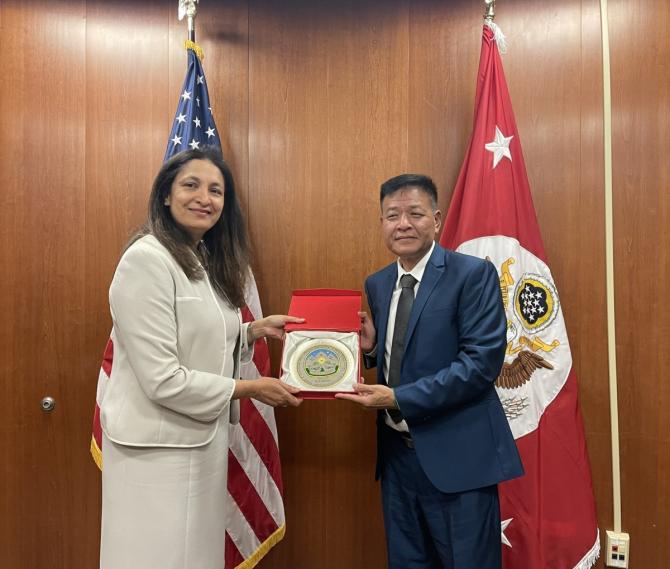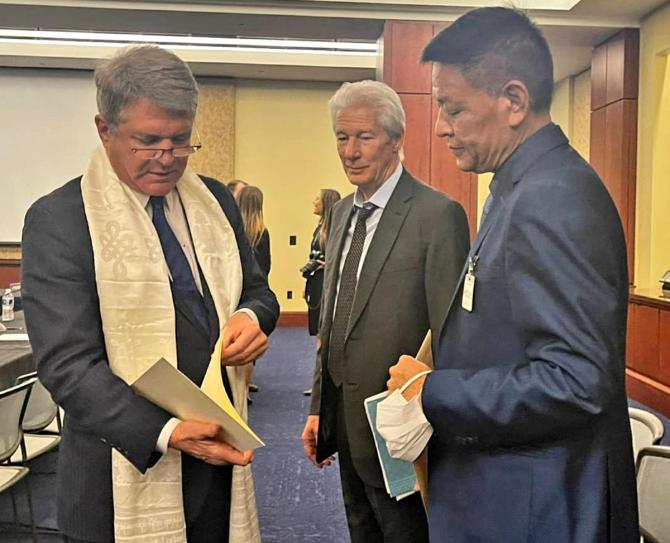 | « Back to article | Print this article |
One priority for Delhi (for the new foreign secretary in particular) is to have an in-depth discussion with Dharamsala as soon as possible, suggests Claude Arpi.

Penpa Tsering, the current Sikyong (president) of the Central Tibetan Administration, during a visit to the United States where he met officials of the Biden administration and members of the US Congress, made an odd comment: 'Many people believe that India's first PM Jawaharlal Nehru made a blunder when he recognised China's sovereignty over Tibet, but he did what he thought was best for his country.'
Tsering, however, added he believed that India changed its stance over the Tibet issue after 2014.
The Sikyong said Nehru's decisions over Tibet were due to his own world vision: 'We understand that the national interest comes first for every nation and he did what he thought was best for India at that time.'
The Sikyong is absolutely right in saying that for a nation, its 'national interests' come first, but what Nehru did was against India's interests.

India's interest: A peaceful border
On November 7, 1950, a month after the Chinese invasion of Eastern Tibet, in a letter to Nehru, Sardar Vallabhbhai Patel listed what India's interests were. 'I am, however, giving below some of the problems which in my opinion require early solution... to build our administrative or military policies and measures to implement them.'
The Sardar started with: 'A Military and Intelligence appreciation of the Chinese threat to India both on the frontier and internal security.'
Patel continued:
Patel was probably the first to speak of a double threat, an accepted fact today. He further noted:
Patel told Prime Minister Nehru: 'These are some of the questions which occur to my mind.'

The Sardar did not go into the fate of the Tibetan nation, or its revered leader the Dalai Lama, he restricted himself to the implications for India.
Unfortunately, after articulating so presciently the dangers of the Chinese invasion for India's frontiers, Patel passed away on December 15, 1950, barely two months after the entry of the People's Liberation Army in Eastern Tibet.
Thereafter, the 'friendship' with China's line prevailed, with disastrous consequences which still can be seen today on India's northern borders.
In a personal letter written by Harishwar Dayal, the Political Officer (PO) in Sikkim responsible for Tibet, Bhutan and Sikkim, addressed to Major S M Krishnatri, then posted as the Indian Trade Agent (ITA) in Gyanste, the PO, while discussing the Chinese advance towards the McMahon Line, informed the ITA of Sardar Patel's sudden death, 'It is a heavy blow. He was the one person in this Government who had strong realistic view of things, including on foreign relations. Now, we are left at the mercy of the visionaries.'
It is a fact that the 'visionaries' have a tendency to proclaim lofty ideals, forgetting in the process 'national interests', with tragic consequences for the decades.

India loses a peaceful border
In 1950, Tibet lost its independence and India's serene northern frontier vanished.
It is not that India did not have excellent strategic thinkers at the time, but Nehru decided not to use their competence as their conclusions and recommendations were not acceptable to him.
During the tumultuous last six months of 1950, historical records show the emergence of two factions: One led by Prime Minister Nehru and K M Panikkar, his ambassador in Beijing, both obsessed with an imaginary friendship with New China and fixated on the 'larger implications for World Peace' for any decision concerning Tibet.
The other, which immediately saw the strategic implications for India if Delhi were to let Tibet down, was led by Sardar Patel, the deputy prime minister, with Sir Girja Shankar Bajpai, the secretary-general of the ministry of external affairs and Commonwealth relations as his main adviser.
The latter group knew the situation on the ground through the reports of Harishwar Dayal, the Political Officer in Sikkim, and Sumul Sinha, head of the Indian mission in Lhasa, two sincere and far-sighted civil servants.
Incidentally, at that time, India had a full-fledged mission in Lhasa as well as three trade agencies in Gyantse, Yatung and Gartok.
This dichotomy between the officers on the ground with accurate first-hand information and the 'visionaries' in Delhi continued till October 1962; we know what happened then.
Very in India realise that most of the senior leaders of the Congress party (including President Rajendra Prasad, C Rajagopalachari, K M Munshi, etc), immediately saw the consequences of the entry of the Chinese Liberation Army in Tibet: India would lose a peaceful border which did not even need to be manned by police and this for centuries.
What is worse is that the prime minister refused to hear his senior Congress colleagues after Patel asked for a Cabinet meeting to discuss the issue; his request was not even acknowledged, Tibet would never be discussed.
We can still see the consequences for India's Northern borders.

Even leaders like Shyama Prasad Mookerjee, who had left the government (over the massacre of Hindus in East Pakistan), had strong words when he intervened in Parliament on December 6, 1950.
Dr Mookerjee said: 'With regard to Tibet, we sent frantic appeals to China asking her not to be violent, but did China listen? What is the policy behind China's action? It is no use our trying to gloss over things because these are matters which affect not only the people of Tibet but also the security of India.'
The Jan Sangh leader analysed: 'It is a fact that the boundary between India and Tibet is yet to be definitely defined. The prime minister said the other day that we stand by the McMahon Line, but the maps of China which are in circulation even now include portions of Assam, Ladakh and Leh and territories in which India is vitally interested.'
'The reply that China has sent to India on the question of Tibet definitely indicates that China will do everything necessary for the purpose of keeping intact what it considers to be China's border and when it refers to the Chinese border, it includes Tibet as well and the undefined boundary of Tibet so far as it touches the Indian border.'
This was just two months after China had invaded Tibet.
Change for the better since 2014
In Washington, Penpa Tsering also told reporters that things have changed in India since 2014: 'I think India has changed its policy by not repeating that Tibet is part of People's Republic of China, because India's position is that India has to abide by the one-China policy, then China also has to abide by one India policy regarding Kashmir.'
This did not, however, stop Beijing to abundantly comment (and criticise India) when Article 370 of the Constitution was abrogated in August 2019.
One can only regret that Delhi has not done more for Tibet and the CTA in particular during the last few years.
It is true that an annual grant of ₹8 crores to the Central Tibetan Relief Committee (CTRC) to meet the administrative expenses of Tibetan Settlement Offices and social welfare expenses, was extended in 2020 for another five years, (up to fiscal year 2025-2026), but a lot more could be done.
It is positive that the Sikyong could meet House Speaker Nancy Pelosi, Under Secretary for Civilian Security, Democracy, and Human Rights Uzra Zeya and Kurt Campbell, Biden's top adviser on the Indo-Pacific, during his visit to Washington, DC.
Tsering urged the White House and Congress to help create a global coalition against China and challenge its narrative over Tibet. This should be done in India too.
Today, one priority for Delhi (for the new foreign secretary in particular) is to have an in-depth discussion with Dharamsala as soon as possible.
Claude Arpi is a long-time contributor to Rediff.com and you can read his earlier columns here.
Feature Presentation: Rajesh Alva/Rediff.com